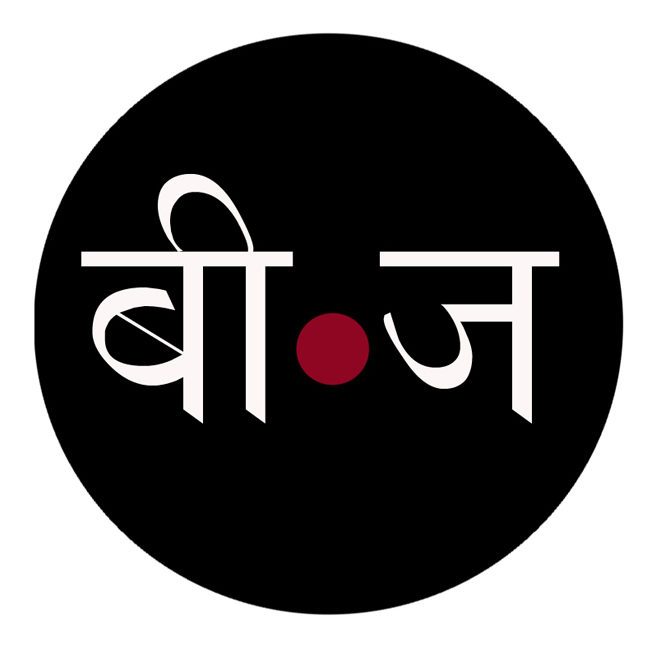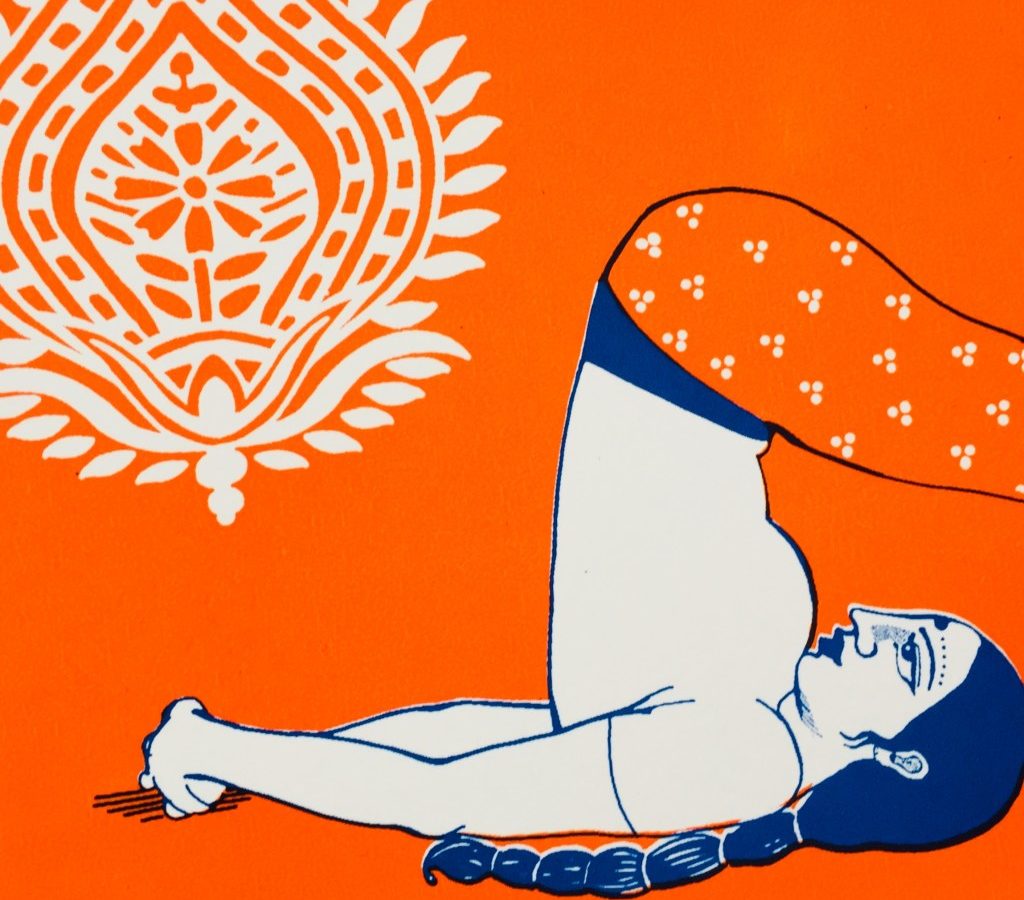A woman, wearing saffron-hued yoga pants is contorted in a delicate backward bend: Matsyana or the fish pose. Her body is taut, her hair thick in a braid, her eyes affixed at a point in the distance, at an object which we can only imagine, as the frame ends there.
Printed on handmade, recycled cotton rag paper from South India, she uses non-toxic water-based paint for the silk screen printing. Her figures are an anti-thesis of the yoga stereotypes—they’re unapologetically rugged, and very Indian. “In relation to yoga, it’s a general worldwide view that yogis need to be of a certain body shape. We really need to see strong, realistic figure heads that encourage people to resist body-shaming stereotypes, to know, accept and love themselves and step into their power, and to live authentically,” says Rachana.
Social media adds fuel to the downward spiral. “It definitely adds to this pressure as you only see beautifully perfect bodies set against exotic backdrops. I think most people in general, irrespective of how old they are and what they do, do suffer from body image related insecurities.”
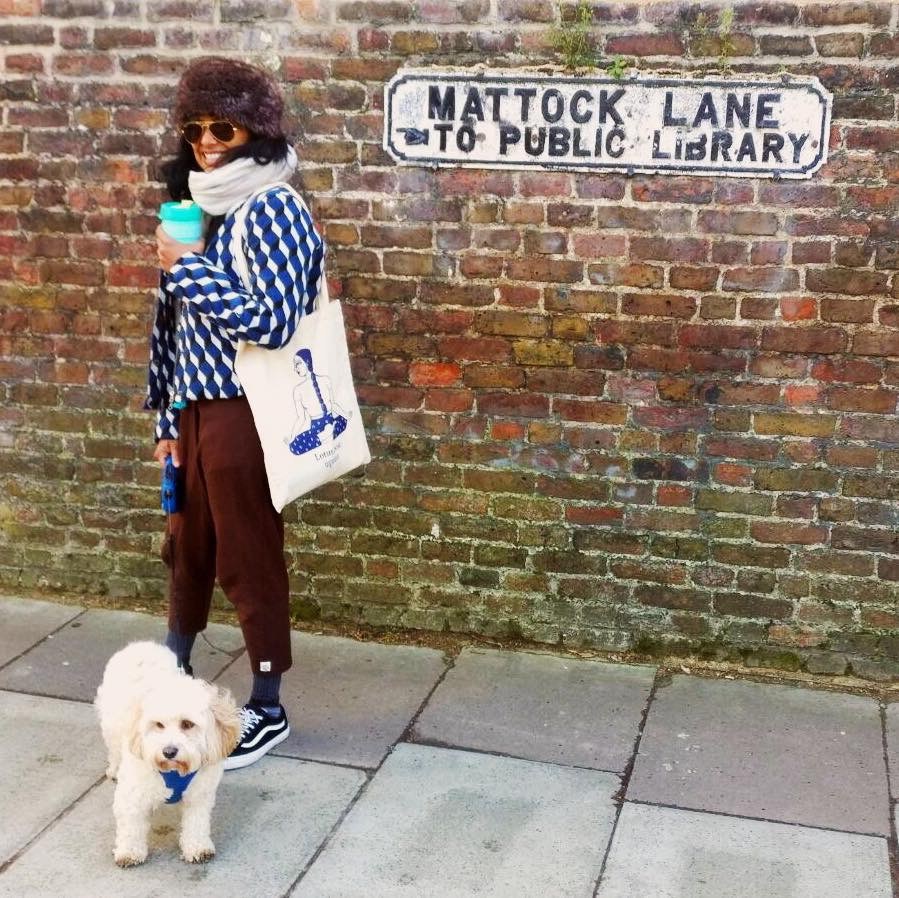
She grew up in Bangalore, and had an idyllic childhood. During the long summer months and short winter breaks, the family decamped to their coffee estate in southern Coorg. She and her siblings learnt swimming in the Kaveri River, which snaked through their estate. They rowed boats down the river and discovered snakes and spiders in the underbrush while exploring the land with their parents.
Rachana’s creative inspiration came from her mother, an amateur artist who dabbled in oil paints. “The smell of linseed oil always brings to mind an image of her at her easel, painting. I have her to thank for my interest in art. She comes from an incredibly artistic stock and noticed early on that I was artistically inclined at a very early age,” she says.
Rachana was packed off to learn under the tutelage of Raja Ravi Varma’s great grandniece, Radhika Varma, who Rachana describes as “an amazing artist in her own right and an exceptional art teacher.” She learnt from Radhika everything about drawing portraits and figures. She then joined the Karnataka Chitrakala Parishath and completed a five-year degree in commercial art.
“My inspiration comes from the bold colours and traditional prints of India. I like to combine these with individual elements of stimulus from London and travels further afield to create colourful, vivid and curious prints,’ she says. Rachana tells us how her love for Yoga helped her create a visual vocabulary for it.
What drew you to Yoga? How did the practice help in your evolution as a person?
In 2009, I was working as a fulltime graphic designer in Bangalore. We worked really long and stressful five day weeks, which extended sometimes to six days. I had an unbalanced thyroid and had heard hat yoga was really beneficial for it. It didn’t help that I was under a lot of stress emotionally too. I was trying to get my life back on track after a very painful divorce.
Yoga, along with running, really helped focus me my mind. It helped me make constructive choices, instead of turning on to a path of destruction. It also helped that the yoga class was very near my house, so it fit in to my work schedule very well.
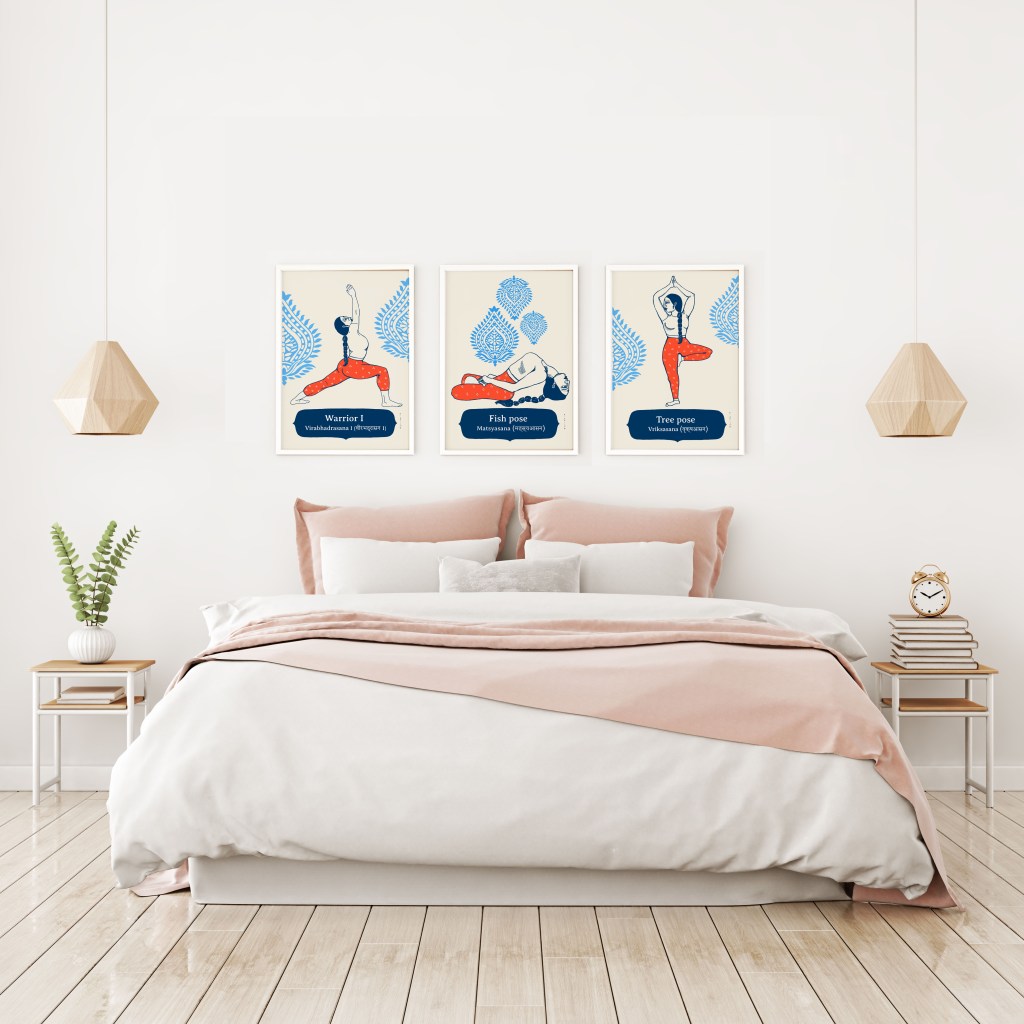
Is this the reason why you chose to incorporate it in your art?
I’m extremely passionate about Yoga and it has shaped my habits and thought processes to a large extent. I spent three months in Mysore immersed in yoga, undergoing a rigorous teacher training just to improve and expand my practice. So, when I started exploring styles and subjects for my prints, my Indian heritage and Yoga were the most natural choices. Also, in a creatively challenging and highly competitive market like London, one really needs to work hard to be different and I felt that creating beautiful, yoga related art would do that for me.
From Bangalore to London, tell us about that.
My husband Paul is an Englishman and we met in 2013 while he was working as an expat in Bangalore. After his contract in India expired, we decided to move to London as he wanted to launch his own consultancy there. I joined a graphic design agency, but found it even more hectic than the one I had worked in India. I had no time for yoga or any self-care routine. Life revolved around travelling to work and back. Also, the kind of jobs I was working on were soulless and made me feel dead creatively.
When it became apparent I was miserable, Paul persuaded me that it was time for me to have a go at doing something that made me genuinely happy. He gifted me a screen printing workshop at The Print Club, based in East London two years ago. I was instantly hooked.
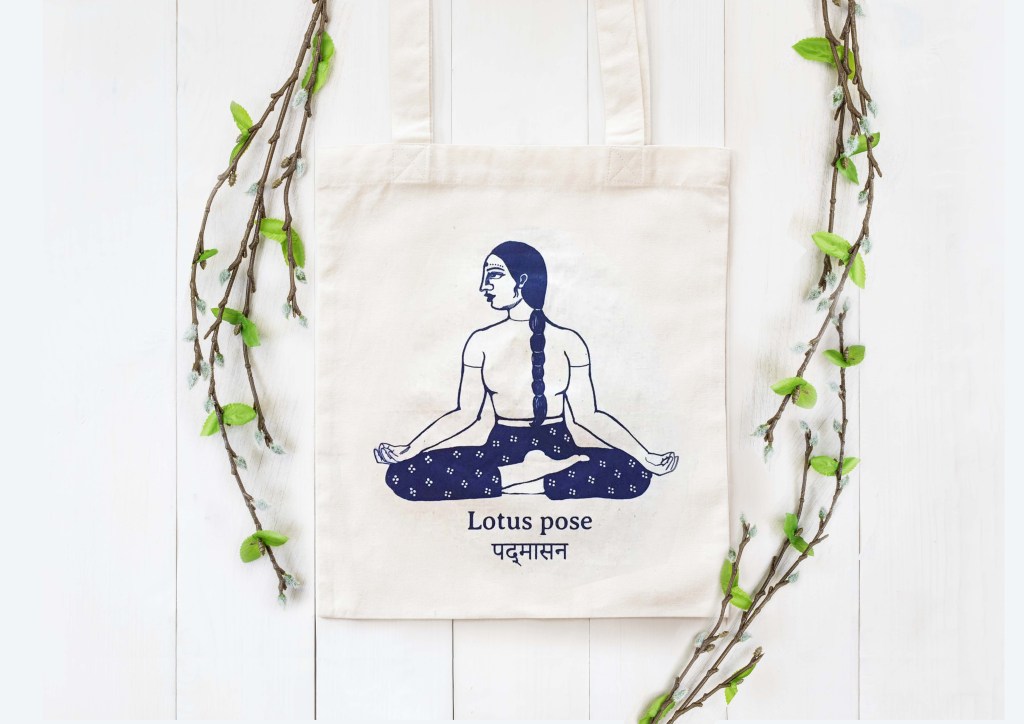
Tell us about your artistic practice.
I spent the last 17 years working as a graphic designer, so I approach print making from a very graphic design-inspired background. I like bold colours, simple graphic forms and structured layouts. Once I decide on the poses, it takes me a week from illustration to art, and finally screen printing them. My work so far has been dominated by shades of blue and orange, but this is not a conscious decision—I have always loved the contrast of these two colours.
I will be exploring and expanding my colour palette for my next series of prints. I primarily create screen prints, but I am planning to go back to painting on canvas, which is my original love. I’m looking to expand into home decor and accessories too. I would like to expand my printing skills by learning and combining printing techniques like etching and lithography.
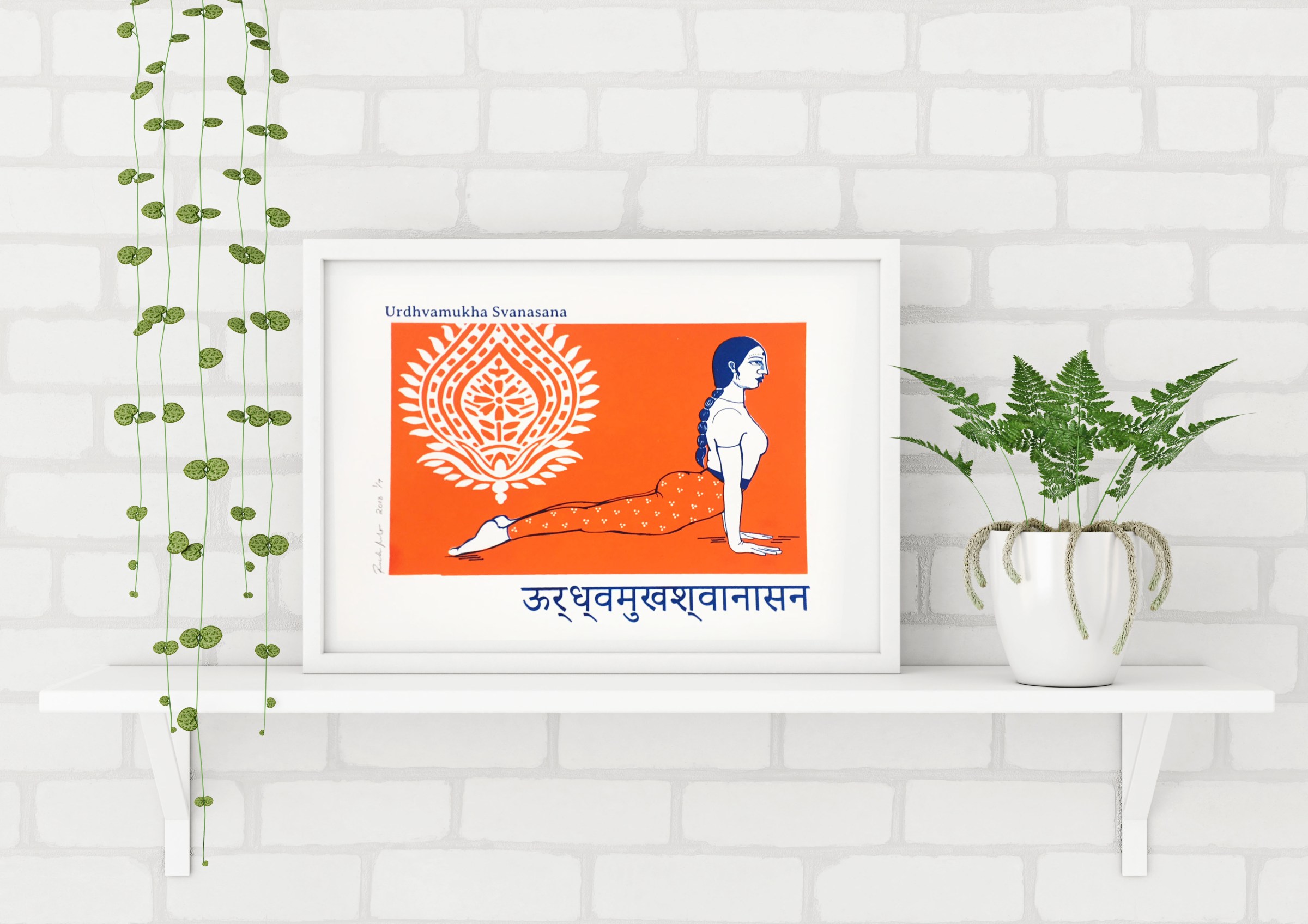
What’s the most challenging part of your work and the most rewarding?
I would say that the most challenging part of my work is the actual screen printing process as it demands me to be very precise and technical, qualities which don’t come naturally to my artistic brain. This is something I have developed over time and practice and I am still working on it! Holding a finished screen print in my hand and having it look and feel exactly like how I envisioned it at the design stage is the best feeling.
In the digital age, how relevant are illustrations?
I love sketching on paper. The softness you get from a pencil or a paint brush is hard to reproduce. But I think in this day and age it is important to be comfortable with both mediums. Because of the bold and graphic style of my prints and my design background I am very comfortable with the Adobe’s design software and can very comfortably hand draw my illustrations on my Wacom Cintique tablet using photoshop.
Drawing directly on to the computer this way helps eliminate two really huge steps in my practice. I still draw and sketch my preliminary ideas and layouts on my sketch book.
I have spent so much time working as a creative in a very consumer driven environment, my brain subconsciously tends to look at things from a consumer’s point of view.
The figures in your prints are very robust, not as lithe and lean as yogis are typically perceived.
I have always loved drawing strong and naturally voluptuous figures. I drew inspiration from India’s temple sculptures, especially the Kama Sutra while developing the figures.
My figures are not 100 per cent anatomically accurate, as I have used my artistic license to exaggerate some aspects of the body. But I do use a photographic reference for the poses, so that my figures look visually accurate to the pose they are demonstrating.
How can we appreciate our bodies for what they are?
The one true way to fully understand, appreciate and really respect your body is to set realistic physical goals for yourself and work towards achieving it. During my early twenties I was someone who went on crazy diets, skipped meals and never really understood the importance of treating my body with respect and care.
After I discovered yoga I stopped caring about how I look and focussed more on how I felt.
The stronger you feel physically, the more confident you are mentally and the rest just falls into place!
Where do you look for inspiration?
Strong, disciplined and highly motivated people really inspire and fascinate me as these are qualities I myself am striving towards. After 17 years of living a life dictated by an office schedule, I find that working on my own, while being extremely liberating, is also highly challenging and is impossible unless you are very disciplined and highly motivated.
I love going to museums and art exhibitions. I love gardening; planting things and watching them grow. I adore flea markets and vintage markets. I love all sorts of music, but when I am working, I listen to old school jazz and a bit of R&B soul, like Etta James. The movies I like are The Blues Brothers and The Usual Suspects.
My getaways are city breaks and long day treks with Paul and my dog, Iris. We’re sporty people and squeeze scuba diving or trekking into our itinerary. Besides Goa, Spain, Thailand and Cornwall in the UK are some of our favourite getaways. The Coco Shambala in Goa is my favourite hotel, a great combination of aesthetic beauty, food and warm hospitality. We love it so much that we even got married there!
Describe a day in your life.
My mornings usually start with brisk walk in the park with Iris. I have a breakfast smoothie and hit the gym, then cool off with a half hour yoga practice. I eat lunch by noon. I go to the studio two to three days a week, leaving around 1 pm and return by 7 pm. We eat dinner an hour later and are in bed by 10 pm. The other days I either work from my home studio or stroll down to coffee shops that offer dog-friendly co-working spaces as well.
What is your measure for success?
Health and happiness.
What does slow living mean to you?
It means working on my own terms, making time for self-care, creating time to nurture my marriage and the relationships that are important to me. It also means enjoying long walks with my Iris and exploring my creativity as an artist.
This article was first published here
Want to share your story of how you thrive? Write to us at [email protected]

